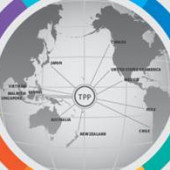Our website uses cookies so we can analyse our site usage and give you the best experience. Click "Accept" if you’re happy with this, or click "More" for information about cookies on our site, how to opt out, and how to disable cookies altogether.
We respect your Do Not Track preference.

After five years of negotiations, government ministers from the 12 Trans-Pacific Partnership (TPP) countries - New Zealand and Australia, Brunei Darussalam, Canada, Chile, Japan, Malaysia, Mexico, Peru, Singapore, United States, and Vietnam - announced their conclusions this week.
The full details of the agreement are not yet available but some details have been drawn from statements released by the negotiating trade ministers.
Trade ministers have suggested that several features make the Trans-Pacific Partnership a landmark 21st-century agreement, setting a new standard for global trade while taking up next-generation issues.
One feature of particular relevance to the trans-border flows of personal information is described as:
“Addressing new trade challenges. The TPP promotes innovation, productivity, and competitiveness by addressing new issues, including the development of the digital economy …”.
The ministerial summary adds in relation to electronic commerce:
“In the Electronic Commerce chapter, TPP Parties commit to ensuring free flow of the global information and data that drive the Internet and the digital economy, subject to legitimate public policy objectives such as personal information protection. The 12 Parties also agree not to require that TPP companies build data centres to store data as a condition for operating in a TPP market, and, in addition, that source code of software is not required to be transferred or accessed. The chapter prohibits the imposition of customs duties on electronic transmissions, and prevents TPP Parties from favouring national producers or suppliers of such products through discriminatory measures or outright blocking. To protect consumers, TPP Parties agree to adopt and maintain consumer protection laws related to fraudulent and deceptive commercial activities online and to ensure that privacy and other consumer protections can be enforced in TPP markets. Parties also are required to have measures to stop unsolicited commercial electronic messages. …. The 12 Parties agree to cooperate to help small- and medium-sized business take advantage of electronic commerce, and the chapter encourages cooperation on policies regarding personal information protection, online consumer protection, cybersecurity threats and cybersecurity capacity.”
New Zealand’s Ministry of Foreign Affairs and Trade has established a new TPP website and plans to publish a series of fact sheets on the arrangement.
Back